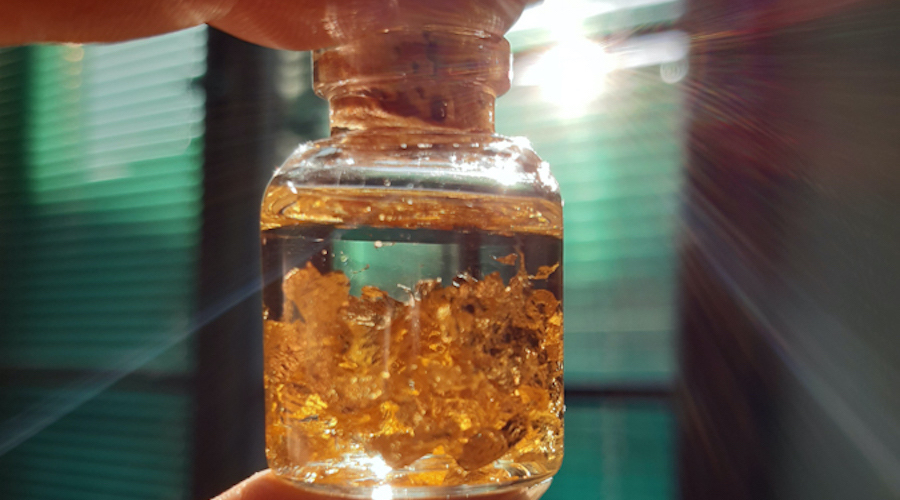Scientists develop solution to avoid gold particle corrosion
Staff Writer | February 7, 2024 | 6:06 am Education Suppliers & Equipment Asia Gold Platinum

Gold particles in a bottle. (Reference image by Karolina Fok, Wikimedia Commons.)
"An international team of researchers has discovered a way to improve the durability of gold catalysts by creating a protective layer of metal oxide clusters.
In a paper published in the journal Nature Communications, the scientists say that the enhanced gold catalyst can withstand a greater range of physical environments compared to unprotected equivalent materials. This could increase their range of possible applications beyond the usual industrial and healthcare settings, as well as reduce energy consumption and costs in some instances.
The article explains that the reason gold appears so shiny and alluring is because it is chemically resilient to physical conditions that might otherwise tarnish other materials, for example, heat, pressure and oxidation.
Paradoxically, at nanoscopic scales, tiny particles of gold reverse this trend and become very reactive, so much so that for a long time now they have been essential to realize different kinds of catalysts, intermediary substances which accelerate or in some way enable a chemical reaction to take place.
“Gold is a wonderful metal and is rightly praised in society, and especially in science,” Kosuke Suzuki, co-author of the study from the University of Tokyo, said in a media statement. “It’s great for catalysts and can help us synthesize a range of things, including medicines. The reasons for this are that gold has a low affinity for absorbing molecules and is also highly selective about what it binds with, so it allows for very precise control of chemical synthesis processes. Gold catalysts often operate at lower temperatures and pressures compared to traditional catalysts, requiring less energy and reducing environmental impact.”
Gold can corrode
Suzuki pointed out that as good as gold is, it does have some drawbacks. It becomes more reactive when it’s in the form of tiny particles and there is a point at which a catalyst made with gold can begin to suffer negatively from heat, pressure, corrosion, oxidation and other conditions.
The researcher and his team thought they could improve upon this situation and devised a novel protective agent that could allow a gold catalyst to maintain its useful functions across a greater range of physical conditions.
“Current gold nanoparticles used in catalysts have some level of protection, thanks to agents such as dodecanethiols and organic polymers. But our new one is based on a cluster of metal oxides called polyoxometalates and it offers far superior results, especially in regard to oxidative stress,” Suzuki said.
“We are currently investigating the novel structures and applications of polyoxometalates. This time we applied the polyoxometalates to gold nanoparticles and ascertained the polyoxometalates improving the nanoparticles’ durability. The real challenge was applying a wide range of analytical techniques to test and verify all this.”
The team employed no less than six spectroscopic methods which vary in the kinds of information they reveal about a material and its behavior. But generally speaking, they work by casting some kind of light onto a substance and measuring how that light changes in some way with specialized sensors. Suzuki and his colleagues spent months running various tests and different configurations of their experimental material until they found what they were seeking.
“We’re not just driven by trying to improve some methods of chemical synthesis. Many applications of our enhanced gold nanoparticles could be used to benefit society,” Suzuki said. “Catalysts to break down pollution (many gasoline cars already have a familiar catalytic converter), less impactful pesticides, green chemistry for renewable energy, medical interventions, sensors for foodborne pathogens, the list goes on.”
“But we also want to go further. Our next steps will be to improve the range of physical conditions we can make gold nanoparticles more resilient to, and also see how we can add some durability to other useful catalytic metals like ruthenium, rhodium, ... "
https://www.mining.com/scientists-devel ... -corrosion